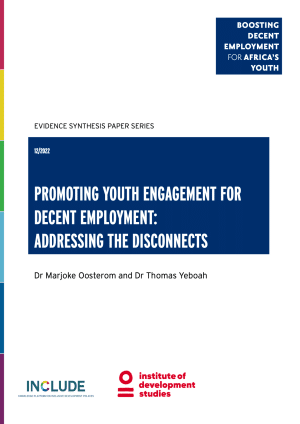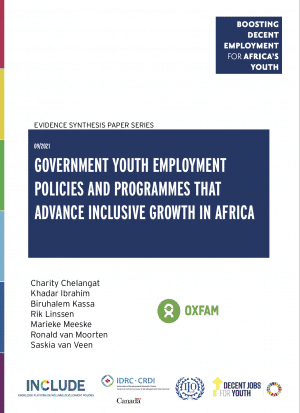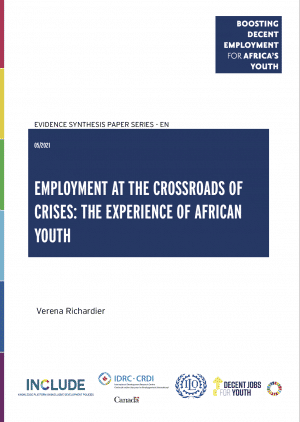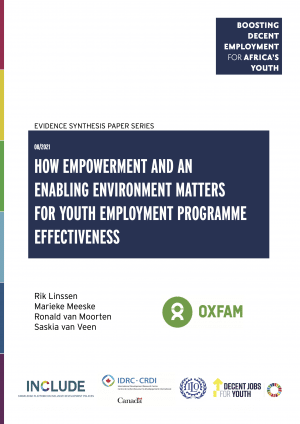
By Ruth van de Velde, Siri Lijfering, Joscha Betke and Agnieszka Kazimierczuk
Digitalisation and technological advancements are changing the world of work and the skills needed for employment. In Sub-Saharan Africa alone an estimated 230 million jobs will require digital skills within the next decade offering employment opportunities for its ever growing youth population. However, young people in Africa face several barriers that prevent them to obtain the types of skills required for employment. The evidence synthesis paper published by INCLUDE explores the challenges and opportunities of this digital transformation and presents recommendations of how to equip Africa’s youth for the future of work.
Digital advancements are changing the world of work. It is estimated that over the next ten years, 9 out of 10 jobs globally will require digital skills. This digital transformation has the potential to reverse the trend of ‘jobless growth’ in Africa, altering the structure of African economies by investing in digitally-enabled decent jobs. However, it is still unclear what the main challenges and opportunities are in this transformation and which skills are needed to capitalise on it. To find an answer to these questions, INCLUDE commissioned ThinkYoung, an international youth Think Tank, to critically engage with the key interrelated drivers and barriers to digital skills development and employment for young people in Africa. The conclusions are now published in the new evidence synthesis paper: Digital Skills for Youth Employment in Africa, which sheds light on the question of what digital skills actually are and what is needed to create an enabling policy environment for these.
Digital Skills
Digital skills are specific skills that enable people to use digital technology to solve real-world problems. Broadly, digital skills can be divided into ‘soft’ and ‘hard’ skills. Depending on the work, different skills or different levels of proficiency are required. These range from basic to highly specialized, where one can solve complex problems in big data analytics, computer programming, or Artificial Intelligence (AI).
- Hard skills refer to technical knowledge and skills for using digital technology. These are skills you are trained for, they can be measured and are often job specific, like coding or using particular software.
- Soft skills are the skills you need to navigate and learn in the digital world. They are generally taught and developed throughout the life cycle. Digital soft skills are often cognitive, social and emotional skills. They are abilities that people use for communication, creativity and problem-solving, including skills such as content creation and decision-making.
Foundational skills are a precondition for developing digital skills. These include basic skills, such as basic literacy and numeracy, and transferable skills, such as self-regulation and self-esteem, teamwork, dealing with emotions, and self-confidence. Foundational skills provide the building blocks for lifelong learning. To invest in digital skills therefore also means investing in foundational skills.
In addition to digital and foundational skills, digital literacy becomes increasingly important in the future of work. Digital literacy encompasses both the different abilities/skills and levels of proficiency that allow someone to access, use, manage and create digital information and digital tools. Digital literacy empowers people in exchange, collaboration, and participation through ICT.
Barriers to Digital Skills Development in Africa
Many African youths entering the labour market currently do not have the required skills due to the following barriers that they face:
1. Unequal access to digital infrastructure
The digital divide is the inequality between individuals with regard to digital technology. This includes the lack of digital infrastructure coupled with financial inequality (gaps in access to devices, the internet and digital technology) as well as inequality in the use of digital technology due to unequal levels of digital literacy. It is increasingly clear that marginalised groups are at risk of being left further behind.
2. Unequal access to quality education
Primary and secondary education is paramount for developing digital skills, and for the equitable uptake of foundational digital skills and the relevant soft and hard skills. This requires qualified teachers and improved enrolment across the continent, especially in remote areas and among girls. Teaching digital skills also requires access to relevant infrastructure, equipment and connectivity in schools, with a specific focus on rural areas and marginalised groups.

Infographics by Charles Howard
3. Underdeveloped and not up-to-date TVET
Technical and Vocational Education and Training (TVET) has great potential to improve digital skills uptake. It must, however, be carefully designed and targeted with direct input from employers and strong links to the job market. For example, East African countries have effectively begun to overcome TVET challenges by adopting the Regional TVET Qualifications Framework, mainstreaming regional qualifications into national policies and qualification frameworks, and improving overall TVET standards.
4. Gender barriers
Digital technology is not gender-neutral. Girls and women face more challenges in accessing and affording technology and the internet than boys and men. Social norms and gender inequality underlie gaps in digital access and use for women and girls. These norms and inequalities also present barriers to girls’ education, which in turn is essential for learning digital skills. Therefore, policies aimed at digital transformation should be inclusive and focus on gender mainstreaming in digital strategies.
Enabling Policy Environment
Digitalisation as a pathway for development and job creation has become increasingly central to African policies and programmes. The African Union Agenda 2063, for example, puts digital education as one of its key priorities. That includes universal access to quality childhood, primary, secondary, and university education, gender parity, and the strengthening of Technical and Vocational Education and Training (TVET).
Following the increased attention for digital skills in policy and programming, there is a strong need for policy coherence to ensure interventions across the entire digital ecosystem address education system reform and tackle the digital divide and gender gaps. Some key recommendations for this include:
- Improve the quality and relevance of general education through foundational digital skills learning and access to the relevant infrastructure, devices, and connectivity.
- Leverage the potential of TVET by improving links with industry, targeting both high-skilled and low-skilled occupations, and harmonising curricula and qualifications.
- Realise the African Union Agenda 2063 through policy coherence and mutually enforcing actions targeting the digital divide and boosting education and training, digital infrastructure, and employment.
- Gender mainstream digital transformation policies to tackle the digital gender divide and ensure digital skills learning for marginalised women and girls.
- Target digital skills in low productive sectors and informal work to promote digitally enabled jobs for marginalised groups and in the agricultural sector.
- Secure Public-Private Partnerships (PPP) across the entire digital ecosystem to foster digital transformation and structural change.




that great program
Awesome work. Looking to do more research on Digital Literacy myself.